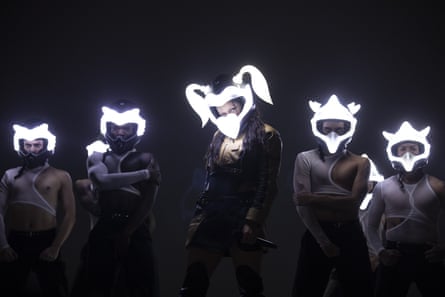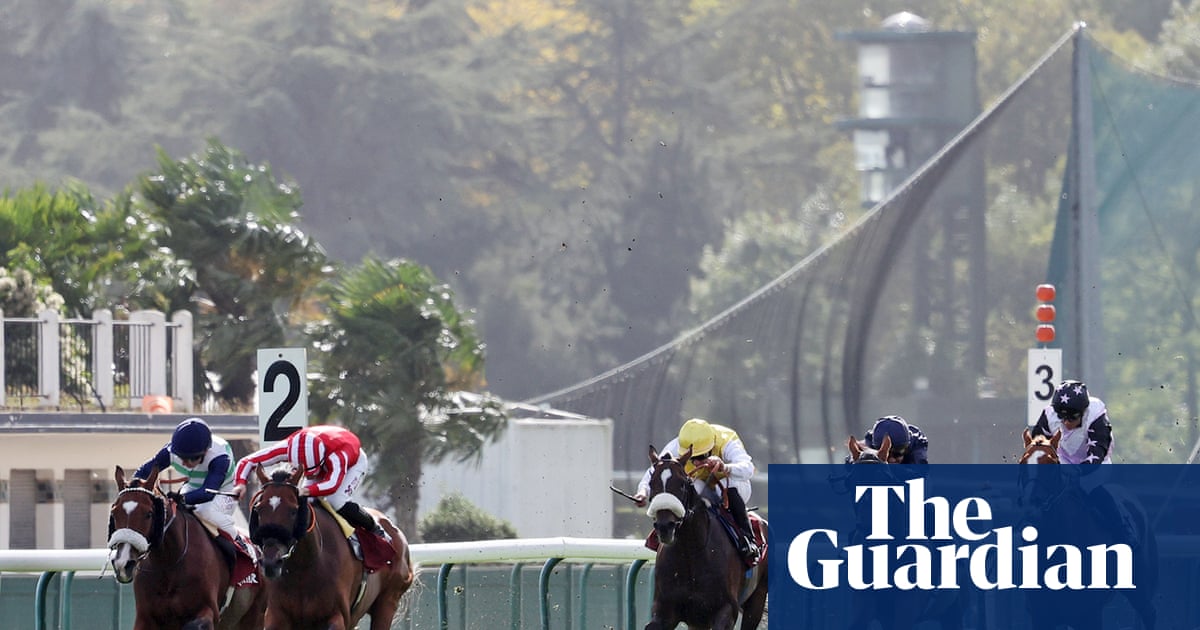With a towering new album about female saints in 13 languages, she’s pop’s boldest star – and one of its most controversial. She revisits her spiritual breakthroughs, and explains why we need forgiveness instead of cancel culture
Rosalía Vila Tobella is just as bored as you are of pop music functioning as gossip column fodder, with lyrics full of hints of rivalries and betrayal. “I’m tiring of seeing people referencing celebrities, and celebrities referencing other celebrities,” she says. “I’m really much more excited about saints.”
The 33-year-old Catalan musician and producer’s monumental fourth album, Lux, draws on the lives of dozens of female saints, inspired by “feminine mysticism, spirituality” and how lives of murder, materialism and rebellion could light the way to canonisation. Rosalía reels them off. Her gothic, operatic new single Berghain borrows from the 12th-century German abbess Hildegard of Bingen (cited like Madonna these days by experimental female musicians). “She had these visions that would pierce her brain. There’s also Vimala, who wrote poetry but was a prostitute, and she ended up becoming a saint because she was one of the first women who wrote in the Therīgāthā,” an ancient Buddhist poem collection written by nuns.
Santa Olga de Kyiv, who lived in the 10th century, was a Protestant, Rosalía continues. “She was considered a saint because she brought so many people to that religion. But she was an assassin – when her husband was killed, she, out of revenge, killed a lot of men. It’s crazy that person can become a saint. In different religions, contexts, cultures, sainthood is understood so differently.”
Rosalía makes a great case for an alternative career as a lecturer; if she wasn’t a pop star, she says, she “would be in college trying to study theology or philosophy”. (Her breakout album, 2018’s El Mal Querer, was her flamenco degree thesis – probably the first time anyone’s received academic honours and Pitchfork’s best new music accolade for one project.) Meeting in a central London hotel room in mid-October, she looks quite saintly, with her waist-length dark hair, the faintest shimmer of makeup and a pale grey long-sleeved jersey dress: quiet luxury via the convent. She speaks softly, reverently, with precision, her assistant nearby to help with translation, though she barely needs it. You do need her guidance to follow the traces of these saints in Lux, which may more obviously be interpreted as a fearsome confrontation of ex-lovers and critical detractors.
Lux is 18 tracks long, features lyrics in 13 languages, two choirs, Patti Smith reading a poem, Björk and the London Symphony Orchestra, and takes further inspiration from the Ukraine-born Brazilian novelist Clarice Lispector and the French philosopher Simone Weil. It’s an exhilarating, towering listen, and leaves behind the South American club sounds of 2022’s aggressively playful Motomami to centre Rosalía’s classical flamenco training: the former scholar twisted the tradition through avant garde electronic production on her first two albums, 2017’s Los Ángeles and El Mal Querer. Everything she’s done has prompted accusations of cultural appropriation – flamenco being the province of Andalusian Gypsies, reggaeton and dembow as Latin American and Caribbean traditions. The culturally voracious Lux also feels like a provocation, underscored by Rosalía’s mastery of its many disciplines: a monomaniacal flex at critics and pretenders by a virtuoso who can rap menacingly in Latin and execute flawless pop iconography. The week after we meet, she gets a halo dyed into her hair.
When writing, Rosalía had a world map on her wall with pins marking the stories of each saint she discovered. “It was like a huge puzzle,” she says. “There’s so much more that I couldn’t fit in. My love is plural and infinite, and it’s about trying to fit as much as I can so everybody could feel welcome when they hear this album.” Some listeners may question exactly what statement she’s making by singing in Hebrew and Arabic; her PR instructs me not to ask about politics, and Rosalía explains that those passages simply reference the Sufi mystic Rabia and the prophet Miriam.

Being a performer, she says, is about “being able to be a channel, a vessel. It’s the most fulfilling when you can stop being yourself. When I see artists like Nick Cave seem to embody otherness, I really admire that. Nowadays, more than ever, I feel like it’s necessary to understand the other. In a world that sometimes feels so divided, for me it’s about collecting stories and making songs out of that the best I can, because it’s the love for the other that allows me to do an album like this.”
What also allowed Rosalía to make an album like this is her unique status. No matter what her critics make of her globe-straddling approach, the exacting study she puts into it, and the supreme execution, are irreproachable. “I always try to find ways to keep learning,” she says. Although she’s learning French and German on Duolingo, she spent a year working with native speakers to get the Lux translations right, including Charlotte Gainsbourg and Justice for the French parts; she also took piano lessons for the first time since she stopped tuition at 16. Equally irreproachable is her pop cultural nous: filming a role for season three of HBO’s Euphoria, modelling for Calvin Klein, being papped taking a bouquet of cigarettes to Charli xcx’s birthday party. On stage on the bravura Motomami tour – probably the decade’s best – Rosalía always had an invasive cameraman on her trail, a comment on voyeurism amplified by the portrait-mode big screens, themselves a sharp reflection on how phones shape our perspective. Rosalía has mastered the sort of celebrity that buys you three years to make an album about God, transcendence and absolution, blowing the budget several times over.
She estimates that she produced 97% of Lux alone. “It probably is the most demanding album I’ve ever tried to do,” she says. She made it in Los Angeles, far from her family and home in Barcelona: “The solitude, the isolation, it’s pretty hard to deal with.” But her work requires that kind of asceticism. “I consider myself pretty social, but to do something like this, there’s no other way – it takes a lot of simplifying the day, doing barely nothing but this.” To write, she has to lie in bed. “It comes much easier when you let it come to you and make the space to try to erase yourself and disappear.”
Much as Rosalía would rather disappear into the heady Lux, all the beatification stuff evidently shrouds a classic breakup album. I am also told not to ask about relationships: in 2023, Rosalía and Puerto Rican reggaeton star Rauw Alejandro ended their engagement, months after releasing a loved-up joint EP. On Rosalía’s rhapsodic new song La Perla, she indicts “un terrorista emocional”. “Mejor hablar / Ahora que / Callarme para siempre,” [“I’d rather speak now than forever hold my peace”] she sings on Focu ‘Ranni – a likely callback to El Mal Querer’s Que No Salga la Luna, sung as the abusive groom of the 13th-century Occitan text Flamenca that inspired the album: “Si hay alguien que aquí se oponga / Que no levante la vo’” (“if someone objects, may they not raise their voice”). Another saint she cites, la santuzza Rosalia, called off her wedding the day before the planned ceremony to live as a hermit.
This may be one experience that attracted Rosalía to the stories of women who transcended their circumstances – though she’s not about to bring it up. A master of saying exactly what she wants and nothing more, she demurs when asked if searching for spiritual guidance inspired Lux: “Definitely, like all humans.” After a moment of silence that we try to psych each other into filling, she shares examples from her past.

Aged 16, she had vocal cord surgery to fix damage from her enthusiastic, untutored singing. “I couldn’t speak for a month – that was very strange, like this fasting of speaking, and then a year of vocal rehabilitation,” she says. “It took me so many years to really feel like I could actually use my instrument.”
At 19, she spent 32 days alone walking the 500-mile Camino de Santiago across northern Spain, affirming her instincts for devotion and defiance.
“Somebody in my family said, you won’t be able to do it because you’re not prepared physically. But I found really good people throughout the way that helped me, and I learned that if I could do this, I could do other things.” A decade later, the pandemic left her isolated in Florida for two years as she made Motomami.
For Rosalía, faith was one way through these trials: the religiosity on Lux isn’t window dressing. “I pray every night before I fall asleep,” she says. “It’s a very personal relationship with God.” Her grandmother and namesake would take Rosalía and her sister Pilar to church as kids. “She is very Catholic,” says Rosalía. “I remember the ritual of it – the beauty of everybody holding hands, no matter who was beside you, and the singing. I really love la communión that’s generated when humans gather, and they project themselves towards something that is bigger than them.” She reads the Bible as much as she can. “I really like San Mateo [the gospel of Matthew]. Everything he says, I think it’s bars”, she says, likening Bible verse to rap lyrics.
Perfect reverence isn’t Rosalía’s style. “I know that I was made to divinise,” she sings in English on Divinize, likening her vertebrae to rosary beads; Reliquia (relic) makes you think of how she cut off a lock of hair to give to a fan each night on the Motomami tour. God Is a Stalker embodies his first-person perspective; the album’s wild array of languages suggests godlike omniscience. On the cartoonish yet seething Novia Robot (“Robot Girlfriend”), Rosalía decries men who want women to be pliant and emotionless, and sings that she’s “guapa para Dios” – hot for God. She says she always second guesses herself when toying with symbolism, “but that’s something I have to deal with. The beauty of art is putting things on the table and proposing questions, and probably finding more questions than answers – but playfulness is important in order to create.”
It feels inevitable that Rosalía will encounter more criticism for Lux. Some fans are disappointed at her telling Le Monde that locking away her phone to focus on recording meant she wasn’t engaged with the conflicts in Palestine and Ukraine (though in response to a fashion designer who questioned her silence on Palestine, she condemned the conflict and said: “I do not see how shaming ourselves is the best way to keep the right moving forward for Palestine’s freedom”). Other criticisms now just seem like occupational hazard: scroll her social media profiles and you’ll see quite a shocking, absurd level of scrutiny and disapproval in the comments.
The beauty of art is putting things on the table and proposing questions, and probably finding more questions than answers
“I see a lot of this cancel culture happening in general, in internet, for everyone,” she says when I ask if she feels misunderstood. “That is always strange to me. I think there’s a need of much more culture of forgiveness. I wouldn’t cancel a friend because we think different. And definitely, I always feel like I have so much to learn and I always try to do things better. But at the same time, I like a lot something that Barthes said [about] the ‘anti-hero … who can bear contradiction without shame’. We all have contradictions. It’s impossible not to in a world as imperfect and contradictory as the one we live in. So I try to stay connected with what my mission is, which is to make music from the most loving place possible.”
Much Spanish media started to turn against Rosalía when she introduced pop to flamenco; she encountered more criticism for the sexualised lyrics on Motomami, and for her thirst-trappy social media presence. There’s a respectability trap for women that the sanctified Lux mocks.
“I deal with that by remembering who inspires me,” says Rosalía. “Irreverent women like Joan of Arc, Aretha Franklin, Nina Simone, Patti Smith, Cher – divas. They carry the weight and they … supportan.” She hunches under an imagined weight. “Endure. And so that is my inspiration. What I love about them is that they are unapologetic about what they want and what they do, what their path is. That’s a guide, un faro – a lighthouse. Through time, diva has had this negative connotation. But nowadays I don’t feel like it has the same way, and I celebrate women that are unapologetic and that do their path.”

She won’t say whether she feels like a diva – “that’s something that you can maybe answer” – but she’s more emphatic on the demands for her to apologise. “I think that whoever hears my music and my way of making music, they know that it comes from the love of trying to learn and share. I think people know my intention.”
Rosalía may be a little naive about politics and relying on the pureheartedness of her musicianship – but her frankly peerless work makes it easy to overlook those qualms, throwing up clashes that are as thrilling as they are edifying if you engage on her level. She talks about Berghain. On this song about dissolving to accommodate a lover’s fear and anger, Björk singing about the need for “divine intervention” is swiftly followed by a different incarnation of the idea, Yves Tumor reprising Mike Tyson’s 2002 tirade at Lennox Lewis: “I’ll fuck you ‘til you love me.”
Many have assumed the song is named after the Berlin techno club – the made-up word is a portmanteau of neighbourhoods Kreuzberg and Friedrichshain – though Rosalía says she’s drawing on the technical translation, mountain grove. “We all have this forest of thoughts inside us where you could get lost,” she says. “I’m not glorifying evil, but darkness is present in life. It makes me think of a quote I really like: ‘The artist who walks beside the devil, putting a hand on his shoulder, can expand our understanding of wickedness.’ I agree so much. Sometimes, when you put opposites beside each other, you can understand both better.” Lux is Latin for light. “There had to be passages that were darker in order for the light to be even brighter.”

 2 months ago
51
2 months ago
51

















































